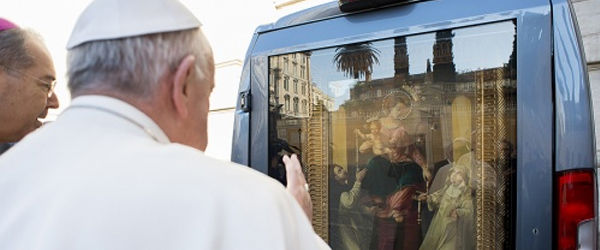However, the "wall of separation" attributed to the First Amendment by the U.S. Supreme Court "introduces two entities, the church and the state, and endows the government with power to assign each to its own sphere separated by a metaphorical wall," said Bishop Curry, chairman of the U.S. bishops' Committee on Catholic Education.
"Religious bodies cannot violate" the First Amendment, he said, because it doesn't apply to the church. "The state may not interfere with the religious affairs of the church but the church is at liberty to interfere in the secular affairs of the state and does so constantly."
The bishop was the opening speaker at an April 11-12 symposium at the university on "Intellect and Virtue: The Idea of a Catholic University," organized to celebrate the January inauguration of John Garvey as Catholic University's president.
"Jesus did not say that Caesar should separate and arrange what belongs to Caesar and what belongs to God, but the wall of separation interpretation does that," Bishop Curry said. "The power to separate is the power to control, but the free exercise of religion means precisely freedom from such government control."
American Catholics, he suggested, should be more assertive in declaring their religious rights under the Constitution. "Catholic commentators have failed to object and have even approved such violations of civil and religious liberties."
One example he gave was the California Legislature's vote in 2002 to repeal the statute of limitations during 2003 for civil suits arising out of sexual abuse of minors, which "clearly targeted the Catholic Church."
In upholding the measure, the judge validated "the power of the state to target the church" and removed the church from "the equal protection of the law," Bishop Curry said.
Bishop Curry labeled the Pauline tradition of deference to civil authority "overly influential" during the past decade. It "has blinded Catholics to the trampling of their civil and religious liberties," he said. Instead, he noted, "we need the counterbalance of the Johannine tradition, of seeing aspects of the great beast in the abuses of government power, especially with regard to Catholicism."
"Because the Declaration on Religious Freedom of Vatican II came as such a relief to American Catholics in that they felt they were now in harmony with American liberties, they tended to assume that the prevailing interpretation of the First Amendment was truly representative of that freedom," Bishop Curry said. "It was not."
Rather, "conferring on government the power to regulate the church and the state and assign them to their proper spheres and to assess what aids or hinders religion is not compatible with the free exercise of religion. Neither is it compatible with the dignity of the human person proclaimed in the declaration," he added.
"In the aftermath of Vatican II and its rejection of triumphalism, many Catholic commentators, thinking that Catholics had been too much for themselves alone in the past, tended to stop being for themselves at all in the present," Bishop Curry said. "As a result, the writing of Catholic history has come in many ways to resemble another lost cause, a long sad tale of woe and failure," with writers focusing on the failure to create "a truly American church."
But "the reality is altogether different," he added.
Bishop Curry said those commentators had forgotten a long history of anti-Catholicism in the United States during the 19th century. That anti-Catholicism, he added, included a series of amendments to state constitutions after the Civil War that forbade state aid to religious schools --- still in effect today and the source of legislation and litigation.
Bishop Curry described them as "anti-Catholic enactments designed to limit and corral Catholicism."
"The history of American Catholicism is not this story of how Catholics failed to adapt to America. It is far more the story of how America failed to live up to its most basic ideals, civil and religious, in how it related to Catholicism."
He also said there is a pressing need to bring intellect and clarity to Catholic schools' relationship with government, especially in terms of public assistance to religious schools.
"Public assistance that is within the power of the state to give should be seen as a right, not as a privilege," Bishop Curry said. "All children have the right to a good education and some should not be subjected to what is in effect a religious test and denied benefits because of their religion."
Even so, Bishop Curry acknowledged the complexities in redefining the relationship between church and state.
"Inevitably, the limitations of a secular state will curtail the extent to which government agencies can be involved in such thoroughly religious schools,” he said. “Alternatively, the church has the option of adjusting the definition of some of its schools in order to accommodate greater government involvement.”
At the same time "the exercise of intellect" is needed to clarify these issues and "the virtues of courage and candor" are needed "to identify what a secular government may do and how the church is to maintain its own freedom and independence," he said.
"We need a more realistic assessment of the relationship between religious schools and the state than has prevailed in the past."
---CNS
{gallery width=100 height=100}gallery/2011/0415/curry/{/gallery}

